

What does it cover? An eye on global research Research is becoming increasingly global, interdisciplinary and collaborative.
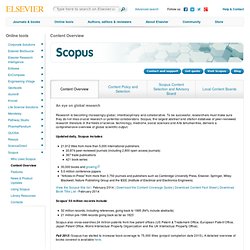
To be successful, researchers must make sure they do not miss crucial research or potential collaborators. Scopus, the largest abstract and citation database of peer-reviewed research literature in the fields of science, technology, medicine, social sciences and Arts &Humanities, delivers a comprehensive overview of global scientific output.
Updated daily, Scopus includes: 21,912 titles from more than 5,000 international publishers20,874 peer-reviewed journals (including 2,800 open access journals)367 trade publications421 book series30,000 books and growing5.5 million conference papers"Articles-in-Press" from more than 3,750 journals and publishers such as Cambridge University Press, Elsevier, Springer, Wiley-Blackwell, Nature Publishing Group and the IEEE (Institute of Electrical and Electronics Engineers) Scopus' 50 million records include: Transparent selection criteria Local Boards. eLibarary.ru. Academia.edu. Google Scholar. Google Scholar. Google Scholar is a freely accessible web search engine that indexes the full text of scholarly literature across an array of publishing formats and disciplines.
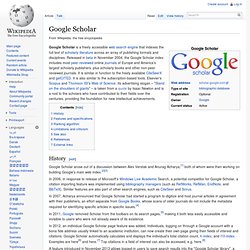
Released in beta in November 2004, the Google Scholar index includes most peer-reviewed online journals of Europe and America's largest scholarly publishers, plus scholarly books and other non-peer reviewed journals. It is similar in function to the freely available CiteSeerX and getCITED. It is also similar to the subscription-based tools, Elsevier's Scopus and Thomson ISI's Web of Science. Its advertising slogan – "Stand on the shoulders of giants" – is taken from a quote by Isaac Newton and is a nod to the scholars who have contributed to their fields over the centuries, providing the foundation for new intellectual achievements. History[edit] Google Scholar arose out of a discussion between Alex Verstak and Anurag Acharya,[1] both of whom were then working on building Google's main web index.[2][3] Ranking algorithm[edit]
H-index. An index to quantify an individual's scientific research output. H-индекс. H-и́ндекс, или и́ндекс Хи́рша — наукометрический показатель, предложенный в 2005 году аргентино-американским физиком Хорхе Хиршем из Калифорнийского университета в Сан-Диего.
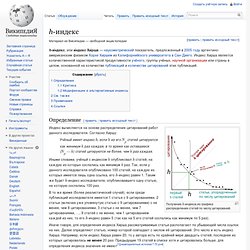
Индекс Хирша является количественной характеристикой продуктивности учёного, группы учёных, научной организации или страны в целом, основанной на количестве публикаций и количестве цитирований этих публикаций. Определение[править | править исходный текст] Получение h-индекса из графика распределения статей по числу цитирований. Индекс вычисляется на основе распределения цитирований работ данного исследователя. Согласно Хиршу: V.5.5] - All Databases Home. Web of Science. Web of Science. Web of Science (WoS) is an online subscription-based scientific citation indexing service maintained by Thomson Reuters that provides a comprehensive citation search.
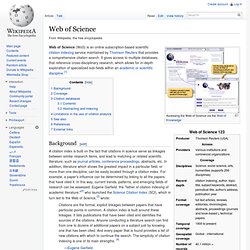
It gives access to multiple databases that reference cross-disciplinary research, which allows for in-depth exploration of specialized sub-fields within an academic or scientific discipline.[1] Background[edit] A citation index is built on the fact that citations in science serve as linkages between similar research items, and lead to matching or related scientific literature, such as journal articles, conference proceedings, abstracts, etc. In addition, literature which shows the greatest impact in a particular field, or more than one discipline, can be easily located through a citation index. For example, a paper's influence can be determined by linking to all the papers that have cited it. Citations are the formal, explicit linkages between papers that have particular points in common.
Welcome to Scopus. Scopus. Overview[edit] Since Elsevier is the owner of Scopus and is also one of the main international publishers of scientific journals, an independent and international Scopus Content Selection and Advisory Board was established to prevent a potential conflict of interest in the choice of journals to be included in the database and to maintain an open and transparent content coverage policy, regardless of publisher.[3] The board consists of scientists and subject librarians.
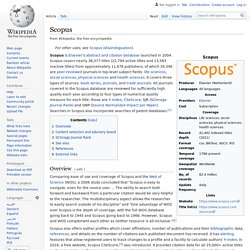
Evaluating ease of use and coverage of Scopus and the Web of Science (WOS), a 2006 study concluded that "Scopus is easy to navigate, even for the novice user. ... The ability to search both forward and backward from a particular citation would be very helpful to the researcher. The multidisciplinary aspect allows the researcher to easily search outside of his discipline" and "One advantage of WOS over Scopus is the depth of coverage, with the full WOS database going back to 1945 and Scopus going back to 1966.